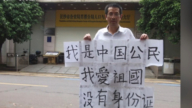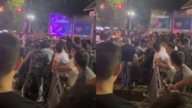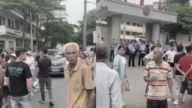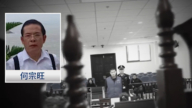【新唐人2013年05月02日訊】新的《精神衛生法》開始施行。條法中解釋,精神障礙的診斷、治療、住院、出院有嚴格的法定程序。精神障礙者住院治療實行所謂「自願原則」;精神障礙的診斷則由精神科執業醫生作出。但法律界人士表示,「被精神病」現象是中共當局的一種故意行為,是否因新法上路而徹底杜絕,還持觀望和懷疑態度。
《精神衛生法》從1985年啟動立法工作算起,到2012年終於獲得通過,經過了27個年頭。根據新的《精神衛生法》,精神障礙的鑑定為醫學鑑定,而不是司法鑑定,並且明確了「非自願醫療」的概念、標準和程序等,不少媒體認為,新的精神法是「被精神病」的終結。
以往精神病院強制收治精神病人沒有設置門檻,輕微病人都可能被強迫住院。報導說,《精神衛生法》適用的對像是嚴重精神障礙者,住院治療實行「自願原則」。住院病人,需經過兩道程序:門診醫生確診;住院前再由經治醫生複診,最終給出確診結論的是經治醫生。
對於中共公布施行的這個《精神衛生法》,大陸民眾普遍表示質疑。而「東南大學」法學教授張讚寧表示,《精神衛生法》出臺表面上說是一件好事情,但是,對「被精神病」現象能否徹底杜絕,他持觀望和懷疑態度。
東南大學法學教授張讚寧:「因為被精神病現象已經是很長期的,這是當局的一種故意行為。有一些人他並不是精神病,它只是由於上訪,由於他自己提出的一些意見,把他關進精神病院。現在我尤其擔心的是,現在公安部門所辦的那些精神病院,仍然沒有取締,或者撤銷。所以這就為『被精神病』仍然留下了一個隱患。」
張讚寧指出,公安部門不是衛生行政主管部門,沒有資格或權力辦精神病院。
張讚寧:「精神病院的管理權,掌握仍然掌握在公安部門的手裡,而不是掌握在衛生行政手部門的手裡,所以這一點我始終是有很大的顧慮,還要拭目以待。」
中國自由作家荊楚表示,對中國大陸的良心人士用精神病名義迫害,這是共產黨一貫的傳統。
中國自由作家荊楚:「因為中國這個政治體制下是官權大於一切,是個特權官本維持社會,在這種情形下,不能夠保證醫生能夠做出公正的判斷。」
而上海訪民陸女士認為,新的《精神衛生法》不實際,恐怕光說不做,難以實施。
上海訪民陸女士:「這個醫生上面讓你怎樣就怎樣,殺你就像螞蟻一樣,如果你進去以後,上面有哪個(官)叫你把他做掉就做掉,就是這樣的。」
陸女士表示,有許多訪民沒有精神病也被當作精神病,強行關到精神病院,期間不許家屬去看,也不允許放出來。
浙江省安吉縣梅溪鎮的上訪維權人士瀋志華,耕地被非法剝奪20年,多方訴求沒有結果,在北京依法信訪時,多次遭到鎮政府工作人員暴力截訪,瀋志華還被強行送往精神病院檢查。
浙江上訪維權人士瀋志華:「送我精神病院,不是一次而是強行兩次。現在我是有苦難辯。我有一個7歲的兒子每天是我帶的,我還有一個癌症晚期的媽媽,也需要我照顧,我真的是很悲慘的。」
瀋志華在遭受種種迫害之後,如今生活拮据,身體非常衰弱。
荊楚:「在這種情況下你說自願還是不自願?說不清。現在是穩定壓倒一切,維穩壓倒一切,對於那些當局認為不太聽話的人,它就想方設法把他關進精神病院。」
據報導,英國規定,如果醫生要收治精神障礙的病人超過28天,他必須把提案和治療方案提交給「精神衛生法庭」。另有一個由精神病專家組成的「精神衛生委員會」,這個獨立的第三方,有權力對「精神衛生法庭」的裁決提出異議。同時來保證社會公眾的利益。
採訪編輯/唐睿 後製/黎安安
China passed first mental health law, will forced psychiatric treatment end?
China implemented a new Mental Health Act regulation.
The regulation said hospital treatment of mental illness
should follow strict law procedures.
Mentally ill patients’hospital stay should
be decided by themselves.
The diagnosis should be done by specialist doctors.
However, lawyers said that a “forced psychiatric treatment"
phenomenon has been deliberately carried out by the Chinese Communist Party (CCP).
After the new regulation is implemented,
will this phenomena disappear? Lawyers are doubtful.
The new Regulation was proposed in 1985,
and was approved in 2012. The approval took 27 years.
According the new regulation, mental illness should
be diagnosed by doctors rather than the court.
The new regulation clearly indicated a “non-voluntary
treatment"concept, standard and process rules.
Some media reported that the new regulation should
be the end of forced psychiatric treatment.
In the past, there no supervision sector had been set
for how mental hospitals take in patients.
Thus, people with minor mental problems
could be forcibly sent to mental hospitals.
Sources said that the new regulation is for dealing
with people having severe mental illness.
It’s based on a “voluntary" principle.
If patients need to stay in a mental hospital,
they should follow two steps.
Outpatient doctors give the diagnosis first; then before
the patient stays in the hospital, specialist doctors re-diagnose and give a final decision.
People in Mainland China generally questioned
the newly promulgated Mental Health Act.
Southeast University Law Professor Zhang Zanning
said the introduction of the act is a good thing in itself,
but he is skeptical whether the phenomenon of “being
labeled mentally ill"will be completely eliminated.
Southeast University law professor Zhang Zanning:
“Chinese authorities have long been intentionally labeling
people with psychiatric illness. Some people are not mentally ill.
However, they are detained in psychiatric hospitals because
they keep petitioning or remain as political dissidents.
I am particularly worried about those hospitals run
by the public security department, which are not banned.
So there is still a hidden danger of being labeled mentally ill."
Zhang Zanning pointed out that public security departments
are not health administrative departments, and thus not eligible to administer psychiatric diagnoses.
Zhang Zanning: “The power of managing mental hospitals
lies in the public security department, rather than the department of health administration.
I always have a lot of concerns over this problem.
We’ll have to see how it goes."
Chinese freelance writer Jing Chu said that
it has been the CCP’s long-standing tradition
to persecute people of conscience in Mainland China under the banner of mental illness.
Chinese freelance writer Jing Chu: “Under China’s political
system, officials’rights outweigh everything else.
The privileged official group controls the society.
In this case, it cannot be guaranteed that doctors
will make fair judgments."
Ms. Lu, a petitioner from Shanghai, believes that the new
Mental Health Act can hardly go beyond empty words.
Shanghai petitioner Ms. Lu: “The psychiatric doctors
follow whatever orders from above.
Killing a so-called patient is just like smashing an ant.
If you are thrown into the psychiatric hospital, you can
be easily killed if an official issues such an order. That is just the case."
Ms. Lu said that many petitioners are labeled mentally ill
and detained in psychiatric hospitals.
They are denied visits by family members, nor released.
Shen Zhihua is a human rights petitioner from
Meixi Town in Zhejiang Province.
His farmland was illegally deprived of 20 years ago.
He petitioned to various departments, only in vain.
When he went to petition in Beijing, he was repeatedly
blocked by officials from his hometown government.
He was also forced to receive mental health examinations.
Shen Zhihua, Zhejiang human rights petitioner:
“They sent me to mental hospitals twice.
Now I am suffering so much, yet unable to tell it to anyone.
I have a 7-year-old son with me everyday.
I also have a mother with late-stage cancer.
I am really living pathetically."
After various persecutions, Shen Zhihua now
lives in poverty, and is in very poor health.
Jing Chu:"In this case, can you say those “patients"
voluntarily attended the psychiatric hospitals?
In today’s China, social stability comes before
everything else.
The authorities will try to send dissidents
to hospitals by any means."
Reports say British doctors must submit a treatment proposal
to the Mental Health Court if they are to keep patients for over 28 days.
Besides, they have a Mental Health Commission,
composed of psychiatric experts.
This independent third party has the power to challenge
the Mental Health Court, and to protect public interests.





























